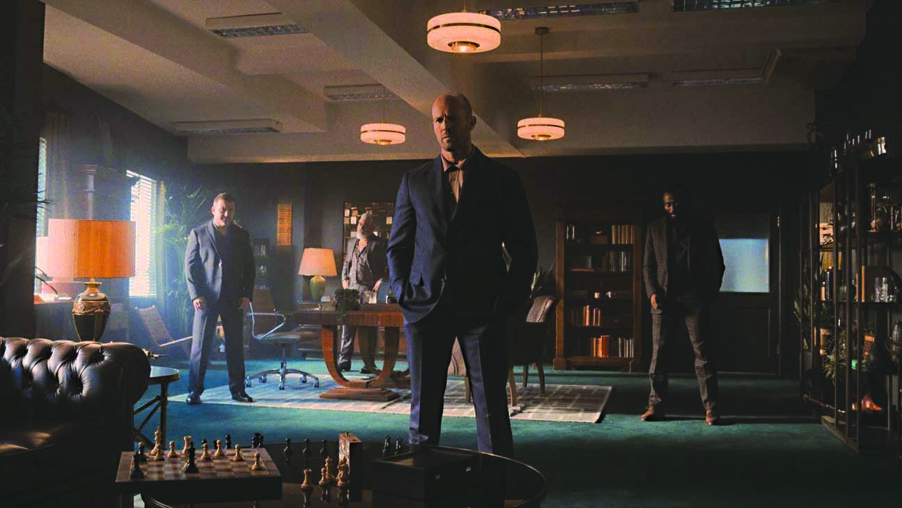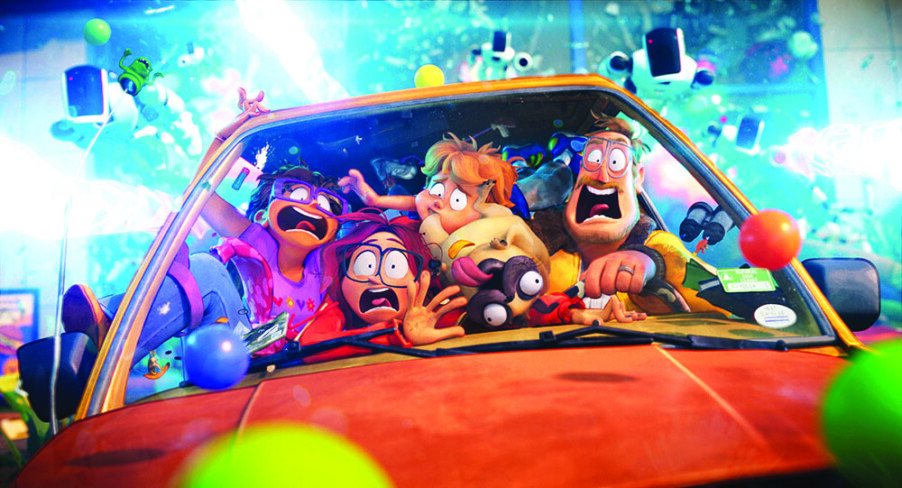A look at Oscar’s International Feature Film nominees
Seeing all of the International Feature Film nominees feels like a personal victory, sort of on par with the thrill you feel at filling a punch card to get a free coffee or cookie.
I know seeing five movies on a list of dozens doesn’t seem like a great accomplishment but it’s a task that can’t be completed every Oscar year, at least not before the ceremony. Some years the international nominees don’t hit the U.S. until weeks later. This year, however, all five of the movies are available for home viewing now. And all are worth a watch, not just for Oscar completists but for any movie fan looking for something different.
• Another Round When I checked awards prediction website Gold Derby on April 12, this Danish movie from director Thomas Vinterberg (who is also nominated in the Directing category) was the favorite to win the category; it’s available to rent (including via Red River Theatres’ virtual cinema) and on Hulu. Starring Mads Mikkelsen, it tells the frequently comic, sometimes troubling story of a group of middle-aged friends who test that Homer Simpson saying about alcohol being the cause of and solution to all of life’s problems. They decide to try an experiment wherein they are slightly buzzed all the time, drinking while at work (as teachers at what appears to be a high school) to see if it makes them happier, more relaxed people, with varying results (particularly as they start to increase their preferred level of intoxication). Mikkelsen gives a strong performance.
• Better Days This Chinese entry is based on a Chinese YA novel (according to Wikipedia) and is available for rent. It follows a young woman, Chen Nian (Zhou Dongyu), traumatized by the death of a bullied student at her high-pressure high school and dealing with bullying herself (as well as her mother’s financial and legal problems). She makes a friend and protector in Liu Beishan (Jackson Yee), a teen who gets by as a petty criminal. Though there is some anti-bullying message-iness, the performances of the leads are solid and engaging.
• Collective Also available via Red River Theatres, for rent in general and on Hulu, this Romanian documentary is also nominated in the Documentary Feature category. If I were an Oscar voter, this would likely be my pick in the International film category, especially for its focus on a newspaper and its journalists as they cover a fire at a nightclub that led to many deaths — first in the fire itself and then at hospitals. The story of those deaths uncovers problems with the safety codes at the club and then problems at the hospitals, where patients died from bacterial infections and the journalists uncovered a scandal related to inadequate disinfectant solutions. We also meet a newly appointed minister of health attempting to reform the system and constantly hitting bureaucratic walls.
• The Man Who Sold His SkinAlso available via Red River Theatres and available for rent, this movie, as end title cards and Wikipedia explain, takes its inspiration from a real-life artist, Wim Delvoye, who tattooed a work of art on a man’s back and gave the man a cut of the sale price in exchange for the obligation of showing up to display the work. Here, Belgian artist Jeffrey Godefroi (Koen De Bouw) offers money and, more importantly, a visa to Sam Ali (Yahya Mahayni), a Syrian refugee who lets the artist use his back as a canvas. The image is itself of a visa, making the work a commentary on immigration and the commodification of people — or something, so Jeffrey explains. For Sam, it’s mostly a means to get to Brussels, where Abeer (Dea Liane), the woman he loves and planned to marry before he had to flee Syria, now lives with her husband. The movie is frequently funny, with moments of sadness, tragedy and absurdity, and Mahayni makes Sam a compelling and complex character.
• Quo Vadis, Aida? Available for rent and on Hulu, this film from a Bosnian director is tense and captivating even if you also know that it is speeding toward tragedy. In 1995 Srebrenica, UN translator Aida (Jasana Đuričić) is frantically trying to protect her husband and two teen/young adult sons as the Serbian army takes over the Bosnian town. Đuričić gives Aida a mix of competence and desperation that is hard to watch but absolutely riveting.
Snack-size movies, supersized stories
Oscar season is one of the few times in a year when I find myself seeking out short films and I always end up wishing I did it more often. Shorts can be such a perfect, quick-hit story-telling mechanism and I feel like they are perfectly suited to the “what can I watch on Netflix for the next 30 minutes?” viewing experience.
This year’s short film Oscar nominees are fairly easy to find at home — and that was even before the release of the short films as a package via virtual cinemas (at places such as Red River Theatres, where you can buy a virtual ticket to see all the films in a category — documentary short subject, animated short film or live action short film).
In the documentary category, all of the films were fairly easy to track down:
• Collette This movie available via The Guardian tells the story of a French woman visiting the German concentration camp where her brother, a member of the French resistance in World War II, was killed so many decades ago.
• A Concerto is a Conversation Available via the New York Times, this film features Kris Bowers, a composer whose work includes the score for the movie Green Book, talking with his grandfather, who left the segregated South and built a dry cleaning business in Los Angeles. This is definitely the most hopeful in tone of the entries.
• Does Not Split This documentary, which I rented on Vimeo, gives us the story of pro-democracy protests in Hong Kong in the months leading up to the start of the pandemic.
• Hunger Ward In war, children are always the casualties, so explain the doctors in this documentary about the starvation of children in Yemen. Available on Paramount+, this short reminded me of the documentaries about doctors in Syria and their determination to save as many lives as they can in the roughest possible conditions.
• A Love Song for Latasha This Netflix short captures the lasting trauma caused by the shooting death of a bright, ambitious girl in a convenience store in Los Angeles in 1991. Though the documentary touches on the wider social issues, it is primarily focused on Latasha as remembered by friends and family and the impact she had during her short life.
In animated short film, two are relatively easy to find on their own.
• Burrow This short on Disney+ is a sweet tale (dialogue-free, outside of cute animal chirps) of a bunny trying to build a dream home. The animation has a pretty, hand-illustrated look.
• If Anything Happens I Love You Largely black and white with a sort of fluid sketchbook appearance, this Netflix short about two people lost in grief was difficult to watch (definitely don’t watch it immediately after dropping your kids off at school) but lovely with moments of remembered joy among all the sadness.
Opera, Genius Loci and Yes-Peoplejoin those previous two movies in the Oscar Shorts presentation available via Red River Theatres virtual cinema and other theaters on shorts.tv. The animated shorts package has other films on it as well, including a short adaptation of The Snail and the Whale that recalls adaptations of other Julia Donaldson books like Room on the Broom and The Gruffalo.
• Opera made me think of a cuckoo clock — like, a cuckoo clock as designed by a children’s book author who had spent time watching Darren Arronofsky’s film mother! Life, death, marriage, religion, war and more are all contained in a pyramid-like space that houses rooms and halls and factories and landscapes that interconnect in ways that aren’t always clear until we move down the pyramid. This one definitely benefits from being able to rewind and take a closer look; it has oodles of little details.
• Genius Locihas a dreamlike quality as its central character moves through a city and through a variety of artistic styles.
• Yes-People’s characters have a charming visual style that blends newspaper comics and a more rounded, almost clay-like appearance. These animated shorts often have the feel of picture books for adults and Yes-People gives us a bouncy look at one day in the life of a group of people with the charm of that kind of story-telling. The movie is also available for rent on Vimeo.
Most of the live action short films are available a la carte now.
• Feeling Through tells the story of a young man, struggling with homelessness, who finds himself helping a man get home. The movie, which is available on YouTube, has a nice mix of uplift and humor.
• The Letter Room has some big names in its cast: Oscar Isaac plays a prison guard whose desire for advancement puts him in what first seems like a dead-end job — reading and recording the mail to inmates. But he finds himself getting mixed up in the lives of two of the inmates. Alia Shawkat (of Search Party and Arrested Development) also appears in this film, which is available for rent on Vimeo.
• The Present is one of three movies I saw via the shorts presentation but it is also available on Netflix. The movie follows a Palestinian man and his young daughter shopping for groceries and a new refrigerator while also navigating West Bank checkpoints.
• Two Distant Strangers, also on Netflix, follows a Black man in New York City who has a fatal run-in with police only to wake up back in the bed where he started his morning. The circumstances around his death can change each time he relives the day but frequently the same quick-to-violence white police officer is the one pulling the trigger. Even with its moments of Groundhog Day humor, the movie never lets the audience off the hook about what it’s saying.
• White Eyetells the story of unintended consequences. A man trying to retrieve his stolen bike finds himself conflicted as he learns more about the man who says he just bought it.
Don’t have time for all the shorts? If I had to pick two must-watches from each category, I’d recommend A Concerto is a Conversation and A Love Song for Latasha in the documentary category, Burrow and Opera in animated shorts (OK, probably Burrow and If Anything Happens I Love You, but I could barely bring myself to watch the latter short the first time and definitely won’t be watching it again, beautifully done as it is) and for live action The Letter Room and either Feeling Through or Two Distant Strangers.
Featured photo: Another Round






